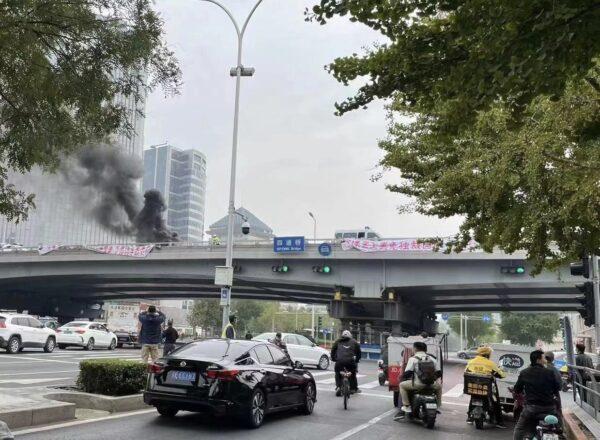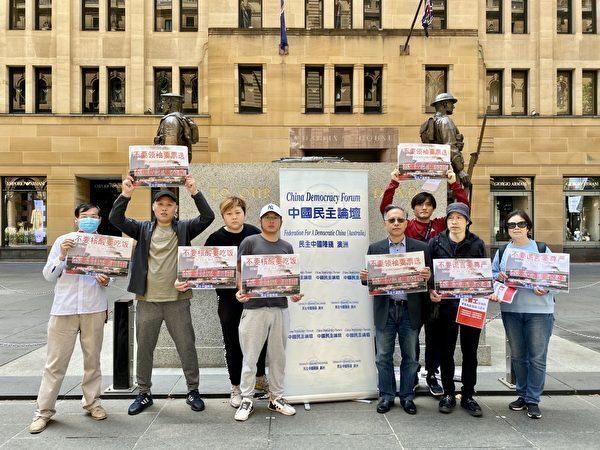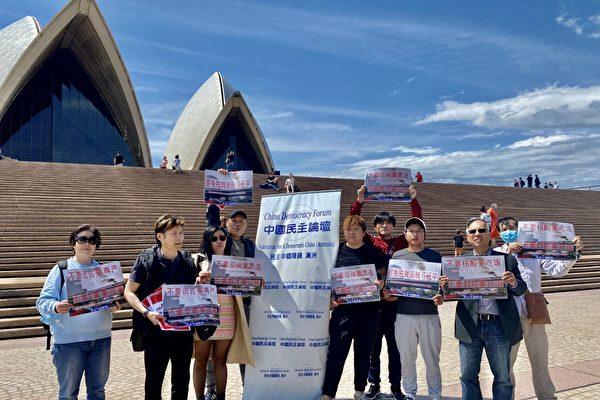Pro-democracy Chinese activists held events at four landmarks in Sydney to support the “bridge man” who protested in Beijing last week.
On Oct. 16, the Chinese Communist Party (CCP)’s 20th national congress, several pro-democracy activists from the Federation for a Democratic China gathered in front of the Chinese Consulate in Sydney to kick off the pop-up event.
They held placards that read “We don’t want lies; we want dignity,” “We don’t want a leader; we want votes,” and “Don’t be a slave, be a citizen” to show their support for Peng Lifa, the man who shocked Beijing and the world.

One banner read, “Let us strike from schools and from work and remove the dictatorial traitor Xi Jinping.”
The other read, “We don’t want COVID tests; we want to eat. We don’t want lockdowns; we want freedom. We don’t want lies; we want dignity. We don’t want the ‘Cultural Revolution;’ we want reform. We don’t want a leader; we want votes. We don’t want to be slaves; we want to be citizens.”
Smoke could be seen swelling from the bridge as the man burnt what looked like tires to attract the attention of passers-by.
Peng’s act of defiance is one of the rare occasions since the Tiananmen Square Massacre in 1989 that a protest banner has appeared on the streets of Beijing directly challenging the communist regime’s brutal suppression of free speech. Videos and photos of Peng putting up the banners and using a loudspeaker to broadcast what he had written on the two banners soon went viral in China and overseas, although censors quickly moved to take down the news in China.
Peng was soon arrested by Beijing police. Since then, there has been no information on his whereabouts or well-being, triggering concerns in China and overseas over his safety.

Peng Sounded the Call to Action
Dr. Chin Jin, the global chair of the Federation for a Democratic China who participated in the pop-up event, said that the CCP is afraid because Peng’s courage is an inspiration to ordinary Chinese people and tens of thousands overseas who seek democracy.“Peng fired the first shot of the contemporary Wuchang Uprising at the cost of his own freedom and life,” Chin said, referring to the armed rebellion against the Qing dynasty in Wuchang District, Wuhan City, in 1911.
“The CCP had to control the incident to prevent the Chinese people from following suit and creating a butterfly effect.”
Other than words and phrases on the banners, additional “sensitive” expressions such as Sitong Bridge, Beijing, Haidian (the district), banners, brave man, and courage have also been censored from Chinese social media platforms.
“China needs to change,” Chin said, “and this brave man has already sounded the call to action.”

‘He is Like the Tank Man’
Chin compared Peng to the Tank Man, who stood in front of tanks heading for student protestors in Tiananmen Square.“He is only 48 years old,” he said, “yet he did such a feat, using his own life to bring light to the future for the entire Chinese people.
“This man, to be honest, is not inferior to the tank man over 30 years ago.”
Peng’s online name “Zaizhou” means “holding up the boat” literally in English, which originates from an ancient Chinese saying, “The water that bears the boat is the same that swallows it up. The proverb advises rulers to treat their people well, as they are the ones that will otherwise overthrow them.”
The activists also went to the front of Sydney City Hall, Martin Place, and the Sydney Opera House. They held placards while chanting “Down with CCP, Down with Xi” in Chinese and English.
Some of the other activists who showed up on the day told The Epoch Times that they wanted to express their solidarity with this warrior on the occasion of the CCP’s 20th National Congress.

The Sitong Bridge is not the first anti-Xi incident in China. A Twitter video shows a protester in a suit holding a banner near the Luohu port in Shenzhen on Jan. 14, chanting, “Down with Xi Jinping! Defend reform and opening up!”
He was taken away by police on the spot. Neither his name nor his whereabouts are known to the public.




